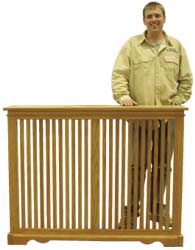By Rachel Lapp
 Have you ever received a sense of God's calling so strong that you changed your life to follow it? Kevin ('84) and Patty Yoder Beck ('87) did. For Kevin, the way in which his Christian beliefs are combined with business is now "Who I am.”
Have you ever received a sense of God's calling so strong that you changed your life to follow it? Kevin ('84) and Patty Yoder Beck ('87) did. For Kevin, the way in which his Christian beliefs are combined with business is now "Who I am.”
Mission Woodworking, the company the Becks started in 1998 in Bristol, Ind., is a growing business and a living expression of faith in action. It is the outgrowth of a business plan created after the Becks attended a special educational series at their church titled "Perspectives on the worldwide mission movement.” Some may be surprised by those origins - and the Becks were, at first, among them.
"Pat and I didn't feel called to be missionaries, but
we both in our quiet times with God felt called to take the class. The first night we were there, we were asked to stand up and share why we were taking the class. We said real honestly, 'We don't know,'” Beck recalled. "Within 13 weeks God had fired me up with this business plan that would result in helping missionaries.”
Beck had learned about the woodworking business during 14 years at Swartzendruber Hardwood Creations, located at The Old Bag Factory in Goshen. "Experience is a great teacher, and the mentoring I received from Larion [Swartzendruber] was invaluable,” said Beck. "I also realized when I started a business that I applied some of what I learned in college; I could understand the principles involved, and it made a difference.”
To establish a product line, Mission Woodworking purchased a line of heating register covers that Swartzendruber Hardwood Creations had been making. In its first week of business, four employees, including Beck, made seven of the special cabinets. Within six to eight weeks they were producing an average of 40 to 50 units a week, and had a backlog of orders - an unusual circumstance for a brand new business.
"We got as high as 120 cabinets, and now we have six people working on that as well as the Prairie style furniture on the side,” said Beck, adding that they have also added equipment in addition to more employees, who are paid "middle management wages,” are not required to work evenings or weekends and are allowed some schedule flexibility. "That's a good business decision for us, because people are able to work and also have the opportunity to focus on what is most important to them, like family,” said Beck, "and that means happier employees and higher production as well as the benefits associated with longer-term employees.”
The company also employs four drivers, divided into teams of two, who make deliveries for most of one week, then come back and load the truck for when the other team, fresh from a week with their families, is ready to hit the road. "This allows us to have great people representing us in the cities and stores with our products. It makes a difference,” said Beck. "It's a ministry, in a sense, because often the only person-to-person contact that clients have with a company is through a driver, and that makes them very important. We get people who really appreciate our products and have good experiences with our drivers, and that leads them to ask about other products.”
The near future for Mission Woodworking includes marketing of a recently developed and patented style of wood cover for baseboard heaters that "does a great job of hiding the heater and looks great in the home,” Beck said. The woodcrafters are also working on jobs to fulfill new contracts for furniture for numerous offices.
While the company's values have never changed, its business plan has - which is not unusual, said Beck. For example, when Mission Woodworking started, Beck explained, "we said we wouldn't invest in a building and tie up capital. We wanted to keep more money free to do the work God called us to do.” But after two years, the company was running out of floor space and negotiations with its landlord to build an addition weren't ultimately fruitful. Said Beck, "We realized we needed to be more in control of our surroundings, and we found a great location in Bristol zoned for manufacturing.” Larger than their facility at the time, there was also room to grow.
In July 2003, Mission Woodworking moved into its new, custom-built headquarters and workshop. Hot water heating was installed in the concrete floor - the best heat for a woodshop, so lumber doesn't warp - and a conference space was realized. One concept from their former building was retained, however; Beck's office is also the company break room. "We liked it so well that we decided to continue it here. The point is that there's no real distinction between an owner and an employee. We have different responsibilities, but we are all equally important,” said Beck.
While staffing and space are an important aspect of the company's integrated, missional vision, one of the biggest differences between Mission Woodworking and similar furniture companies is the way in which it "changes the world, one cabinet at a time,” as its invoices read.
In 2001, the company contributed 17 percent of its net income to chosen missions. Projects include church planting in Senegal, West Africa, and India; Beck and his wife hope to become more involved in youth ministries in the area. But rather than send out a check from its head office, however, Beck invites a representative from the agency to which Mission Woodworking is making a donation, so that one of the company's employees can hand over the check after hearing about its work in the world.
"We want someone to talk from their heart about their work or the work of their agency, like Stanley Green of Mennonite Mission Network, who has visited us here,” said Beck. "Then an employee can tell them, 'We value what we do, and because God calls us to do this and earn money, and called you to sow the seed, let's work together so we can both be productive and successful. We're energized by that.”
While Beck acknowledges that he is the "vision carrier” for Mission Woodworking, he said that it is his job, "to the level he is able,” to "speak my vision in clear terms and definable ideas. We have to talk about who we are every month, and keep things fresh and alive, which can be difficult. Monday mornings, we have staff meetings and talk about what is happening that week, and I also try to share what's happening in me, what I'm hearing and where we want to go,” said Beck. "In essence, I'm sharing my heart in addition to business decisions.”
Beck recognizes that even in a mission-driven organization, there are sometimes divergent opinions. "We've tried to be sensitive to any differences, and keep working on the balances. By and large, everyone is on board with where we're going,” he said.

